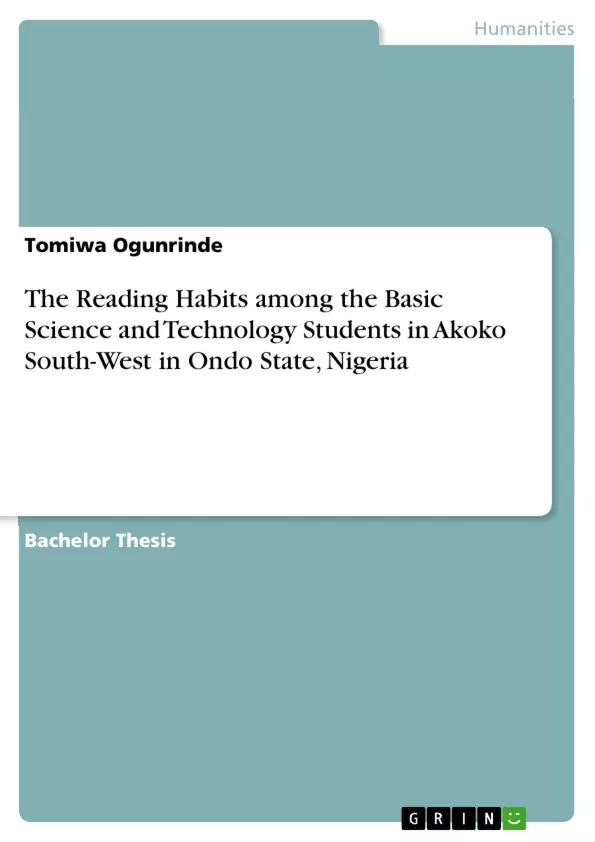Reading habit is fundamental to the success of any student. From observation, the researcher is of the opinion that many students in secondary schools appear to have low reading abilities, this is largely due to absence of library facilities in schools and where present, usually with low patronage of students.
This study therefore investigates the level of reading among Basic Science and Technology students in Akoko South West Local Government Area of Ondo State. A descriptive research design was adopted for the study. The targeted population of this study consists of all Junior Secondary School Students in Government owned schools of Akoko South-West Local Government of Ondo State. A sample of 200 students were randomly selected from five schools equally randomly selected. The instrument used was a self-constructed questionnaire which was validated by two experts from the Department of Science Education. Simple percentage and frequency counts were used to analyze the data collected after the administration of the instrument to the sample.
Inhaltsverzeichnis (Table of Contents)
- INTRODUCTION
- Background to the Study
- Statement of the Problem
- Purpose of the Study
- Research Questions
- Significance of the Study
- Delimitation of the Study
- Definition of Terms
- REVIEW OF RELATED LITERATURE
- The Concept of Basic Science and Technology
- The Concept of Reading Habit
- Empirical studies on Reading Habit
- Reading Habits among Basic Science and Technology students
- School Library and Reading Habit
- Effective Reading Skills as a Prerequisite of Students Development
- Strategies for Improving Reading Habit in Schools
- Influence of New Technology in Child Development
- Summary of Literature Reviewed
- RESEARCH METHOD
- RESULT AND DISCUSSION
- SUMMARY, CONCLUSION AND RECOMMENDATIONS
- Summary
- Conclusion
- Recommendations
- REFERENCES
- APPENDIX
Zielsetzung und Themenschwerpunkte (Objectives and Key Themes)
The primary objective of this study is to assess the reading habits of Basic Science and Technology students in Junior Secondary Schools. This research aims to identify factors that contribute to or hinder reading habits among these students and explore strategies for promoting reading.
- The importance of reading habits for academic success
- The impact of reading on cognitive development and knowledge acquisition
- The role of school libraries and access to reading materials in fostering reading habits
- The influence of technology on reading habits and learning
- Strategies and interventions to encourage reading among students
Zusammenfassung der Kapitel (Chapter Summaries)
The introduction of this study highlights the critical role of reading in student development and academic achievement. It emphasizes the importance of cultivating reading habits for effective learning and knowledge acquisition. The study examines the concept of reading habit and its impact on academic performance, particularly in the context of Basic Science and Technology education. The review of related literature provides insights into existing research on reading habits, including their impact on student development, strategies for improvement, and the influence of new technologies on reading.
Schlüsselwörter (Keywords)
This research centers around the key concepts of reading habits, academic performance, Basic Science and Technology education, school libraries, and strategies for promoting reading. The study investigates the interplay of these concepts and their influence on students' learning outcomes. The study explores the role of technology in shaping reading habits and identifies strategies for fostering reading skills and a positive reading culture within schools.
Frequently Asked Questions
What is the focus of the study in Akoko South-West, Nigeria?
The study investigates the reading habits among Basic Science and Technology students in Junior Secondary Schools within the Akoko South-West Local Government Area of Ondo State.
Why do many students have low reading abilities according to the researcher?
The researcher attributes low reading abilities to the absence of library facilities in schools or, where present, a lack of patronage by students.
How was the research conducted?
A descriptive research design was used, involving a self-constructed questionnaire administered to a randomly selected sample of 200 students from five government-owned schools.
What are the key themes explored in the literature review?
Key themes include the concept of reading habits, the role of school libraries, effective reading skills for development, and the influence of new technology on child development.
What is the significance of reading for Basic Science and Technology students?
Reading is fundamental to academic success, cognitive development, and the effective acquisition of knowledge in science and technology subjects.
What are the recommendations of the study?
The study provides strategies for improving reading habits in schools and emphasizes creating a positive reading culture to enhance learning outcomes.
- Quote paper
- Tomiwa Ogunrinde (Author), 2019, The Reading Habits among the Basic Science and Technology Students in Akoko South-West in Ondo State, Nigeria, Munich, GRIN Verlag, https://www.grin.com/document/1021410



